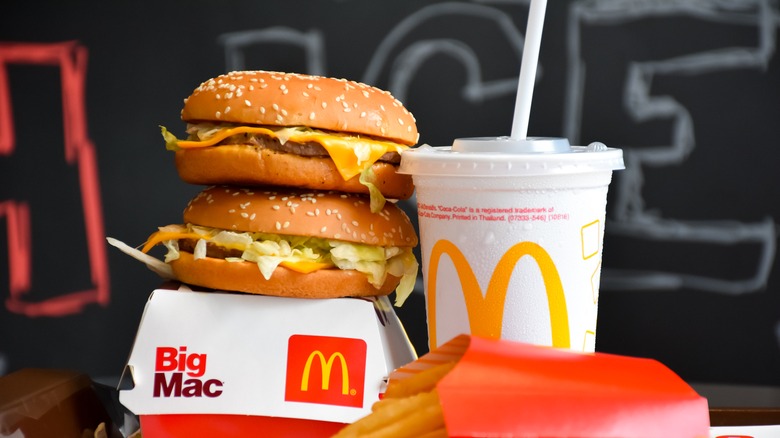The Culinary Movement That Would Stop Fast Food In Its Tracks
For many consumers, stopping by a fast-food restaurant is often a quick and convenient solution to dinner amid a busy week. It's easy and cheap (even with rising food prices). There are now more than 200,000 fast food restaurants in the United States as of 2023. However, if one movement had its way, that number would go down to zero.
Since it was founded in 1989, the Slow Food Movement has slowly been gaining traction both in the U.S. and globally. It has more than 1,600 communities in more than 160 countries. The movement was born out of a protest against putting a McDonald's in Rome, but it has set its eyes on the entire fast food industry in the years since. There are several tenets of the Slow Food Movement, but one of the main ones is a push for local food and produce with a focus on preserving regional customs and traditions. Those who believe in slow food see the globalization of the food industry as detrimental to local identities but also to the environment, pointing to the amount of food waste every year.
According to the philosophy of Slow Food, one should eat food that is good, clean, and fair. Paula Shatkin, a Slow Foods committee member, told Nonprofit Quarterly, "We want people to learn to eat locally and seasonally. Don't buy apples in January that were shipped over here from New Zealand ... Buy apples in apple season."
Criticism of slow food
The Slow Food Movement has a particular focus on reducing the global industrialization of farming, which plays a key role in how fast food restaurants get their supplies. Supporters of the movement highlight how industrialization has led to the loss of regional species of crops. However, while the movement continues to find new audiences, critics have pointed out the flaws with slow food.
Reducing industrialized farms for organic farms may actually have a negative impact on the environment, as it would lead to increased deforestation to produce adequate food. There are around 8 billion people on the planet compared to just 1.6 billion in 1900, before fast foods, which means a significant amount of food production would still be needed.
For that reason, some have accused slow food of wanting its adopters to starve for their beliefs. In a Reddit post, users accused the movement of only catering to the elite, with one person revealing a shocking $700 price tag they paid for a slow food meal for two. In a bid to be more sustainable, some adopters have found the ideology not sustainable. For one, organic food generally costs more at the grocery store, making it hard for many consumers, especially in a struggling economy. One Eater writer found the philosophy to be so restrictive that it actually drove them to McDonald's. While slow food raises interesting points, it has its own flaws as well, and perhaps the true key to fast food is moderation.

